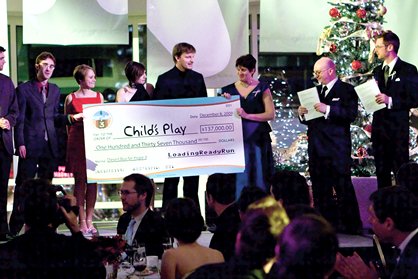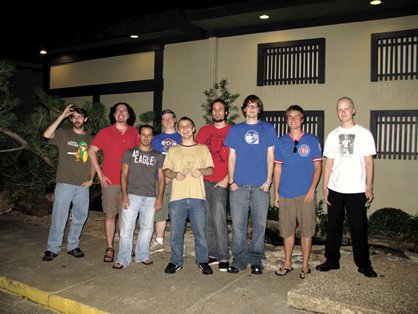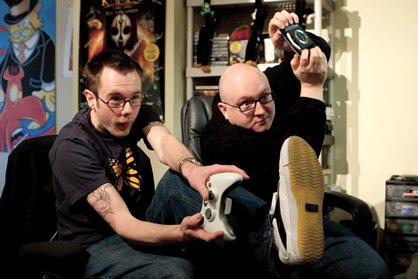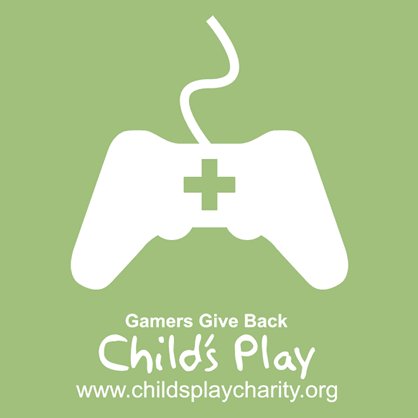When gamers give back
A look inside the inspiring fund-raising that gaming has done for charity
Some people go to extreme lengths for charity. You can walk across the Sahara, bathe in baked beans, or endure public humiliation on live TV, but nothing compares to the horror a Canadian comedy troupe endure every year.

Above: The big check Loading Ready Run earned
Since 2007, Loading Ready Run have played marathon sessions of Desert Bus, possibly the most awful game ever. The goal of this mini-game, from 1995’s Penn & Teller’s Smoke and Mirrors, is to drive a bus from Arizona to Las Vegas at a maximum speed of 45mph. In real time. You have to correct the bus when it veers across the road and, well, that’s about it.
As part of their last Desert Bus for Hope marathon in November, 2009, the Canadians spent five days and 16 hours driving this piece of virtual crap and videostreaming their progress online. There was method in their madness, though: they raised $140,000 (£89,685) for children’s charities. Gaming, you see, has discovered its ability to give.
“In the past year, gaming charities have really picked up,” says Britt LaRiviere, cofounder of Speed Gamers, a speedrunning group that has raised $90,000 (£57,657) for good causes since forming in early 2008. “Thanks to Desert Bus and groups likeMario Marathon, a lot of people are taking notice. Not everybody wants to run a marathon, so this is an outlet to do something else to help and have some fun along the way."

Above: Speed Gamers
Microsoft and Activision have followed suit, fund raising through game sales, or through online events, and MMOs helped in Haiti. EverQuest and Free Realms players donated $25,000 (£16,016) to the relief effort by buying certain items, and Gaia Online promised to match donations made by their players to the tune of $10,000 (£6,413).
Sign up to the GamesRadar+ Newsletter
Weekly digests, tales from the communities you love, and more
“With more than nine million monthly visitors, Gaia Online users are passionate about a broad range of topics, including current events and philanthropy,” says Gaia Online’s Christina Simmons. “Gaia Online is uniquely positioned to tap into the desire that today’s young people have to help those around them. Although this is the first time Gaia Online has supported a fund-raising effort in-world, we’ll definitely consider more philanthropic opportunities in the near future.”
There is a thin line, though, between heart-warming altruism and cynical marketing ploy. Every so often, the entertainment industry churns out an all-star line-up: pop stars making insincere speeches, imagery of starving infants, with Vernon Kay and his blinding teeth doing the presenting.

Above: The men behind Penny Arcade and Child's Play
Charity brings out the sceptic in us all, so it’s especially surprising that the first gamers to give back were sarcasm kings Gabe (Mike Krahulik) and Tycho (Jerry Holkins) – creators of web comicPenny Arcade. Since establishing the charityChild’s Playin 2003, this duo has facilitated fund-raising to the tune of $6,704,247 (£4,294,800).
“We had the idea a long time ago,” says Tycho. “I’m sure this is true of you as well: dorks end up with a lot of spare equipment. When you get a new machine, that old machine doesn’t disintegrate. It’s still useful equipment and can be put to a better purpose than propping open a door or being used as a boat anchor.
"It occurred to us, especially with old consoles that play games perfectly well, there’s a better purpose than for them just to sit in the closet. As soon as we contacted our local hospital about donations, we found out that you can’t donate used products to a hospital. By virtue of necessity, our concept shifted and that’s when we made the first Child’s Play wish list on Amazon.”

In those teething years, Child’s Play was a big two fingers to the media’s image of gamers as drooling morons. “Very quickly, it was no longer the focus to think about those misconceptions,” says Child’s Play project manager Kristin Lindsay. “We quickly saw the positive impact that Child’s Play donations made in the lives of sick children and their families, and it rendered any idea about proving anything irrelevant.”


